World Without End Blu-ray Movie
HomeWorld Without End Blu-ray Movie 
Flight to the Future / Warner Archive CollectionWarner Bros. | 1956 | 80 min | Not rated | Mar 28, 2017
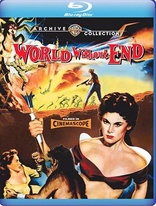
Movie rating
6.9 | / 10 |
Blu-ray rating
| Users | 0.0 | |
| Reviewer | 3.0 | |
| Overall | 3.0 |
Overview
World Without End (1956)
Four astronauts returning from mankind's first mission to Mars enter a time warp and crash on a 26th Century Earth devastated by atomic war. Our heroes meet with hideous mutants, giant spiders, love-struck beauties in short dresses, and jealous old geezers in sparkly skullcaps as they struggle to save humanity and build a new world.
Starring: Hugh Marlowe, Nancy Gates, Nelson Leigh, Rod Taylor, Shirley Patterson (I)Director: Edward Bernds
| Sci-Fi | Uncertain |
| Adventure | Uncertain |
Specifications
Video
Video codec: MPEG-4 AVC
Video resolution: 1080p
Aspect ratio: 2.55:1
Original aspect ratio: 2.55:1
Audio
English: DTS-HD Master Audio 2.0 Mono (48kHz, 24-bit)
Subtitles
English
Discs
Blu-ray Disc
Single disc (1 BD)
Playback
Region free
Review
Rating summary
| Movie | 2.0 | |
| Video | 4.0 | |
| Audio | 4.0 | |
| Extras | 0.0 | |
| Overall | 3.0 |
World Without End Blu-ray Movie Review
Back to the Future
Reviewed by Michael Reuben March 23, 2017The Warner Archive collection is adding the 1956 time travel tale, World Without End (or "WWE"), to its growing catalog of nostalgic cinema schlock. The film was an attempt by "B"-movie specialist Allied Artist to piggyback on the success of Paramount's The War of the Worlds at a fraction of the budget. Released on a double bill with Indestructible Man starring Lon Chaney Jr., the film quickly came and went, but it has since developed a cult following. Today, it is notable primarily for who worked on it, including a young Australian actor named Rod Taylor, in his first leading role in an American film, and the future director of The Wild Bunch, Sam Peckinpah, who served as "dialogue director" (albeit uncredited).
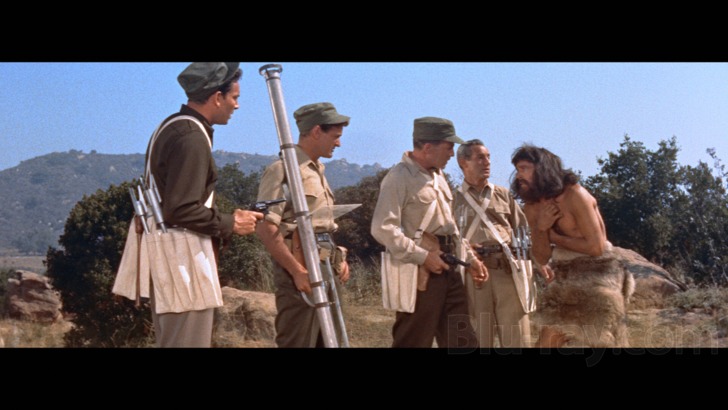
In 1957, the first manned expedition to Mars encounters a mysterious energy field that accelerates the spaceship beyond its instruments' capacity to measure. When the four-man crew regains consciousness, they have crash-landed on what they eventually discover to be Earth—in the 26th Century. A nuclear war has devastated the planet, but enough time has passed for the surface to become habitable. Unfortunately, the inhabitants are a savage one-eyed race that the astronauts dub "mutates". The remnants of human civilization have taken refuge below ground, where their society is slowly dying out. It's up to the new arrivals from the 20th Century to persuade the moribund cave dwellers to fight for their rightful place above ground.
WWE's plot has classic elements that would be recycled many times in future films and TV shows, from Planet of the Apes to Star Trek, but WWE is distinguished by a cut-rate cheesiness so consistent that it becomes almost charming. The model used for the rocket ship obviously has no weight; the snowy landscape in which the ship crashes looks like styrofoam; the giant mutant spiders that attack the astronauts resemble nothing so much as huge (and cheaply made) novelty toys; and no one fires a gun as if they intend to hit anything. While the artificiality continues unabated, the cast gamely pushes onward, reciting scientific jargon and social philosophy with stalwart conviction. Hugh Marlowe (The Day the Earth Stood Still) plays pilot John Borden, a former soldier with a tragic past, and Nelson Leigh (whose sober demeanor made him a regular as a judge on TV's Perry Mason) plays the expedition's resident scientist, Dr. Eldon Galbraithe. Christopher Dark (Suddenly) is engineer Henry Jaffe, who pines for the wife and two children he left behind. Newcomer Taylor plays the communications specialist, Herb Ellis, who is also the expedition's he-man, the object of intense desire by multiple women, including Deena (Lisa Montell), a refugee rescued from the mutate clan. One doesn't have to be Sigmund Freud to grasp why, when the team constructs a bazooka to fight off the mutates, Ellis is the one who hoists the makeshift cannon and fires round after round.
WWE's depiction of the sexes is entertainingly quaint. The women of the future are beautiful, vital and amorous, while the men are repeatedly described as bloodless, exhausted and worn-out. Despite this imbalance in strength and vigor, the women remain dutifully servile, but the arrival of four virile travelers from the future destabilizes the social order, setting every female heart aflutter. Even the elderly Dr. Galbraithe becomes an object of desire, an experience he describes as "exhilarating". The women's reaction to the newcomers prompts jealousy from the indigenous male population, leading to intrigue and, eventually, murder. Neverthless, 20th Century testosterone quickly prevails, as the astronauts rouse the dying subterranean culture to action and lead them in a battle to reclaim the surface, beating back the mutate threat and restoring humanity to its rightful place in the sun.
World Without End Blu-ray Movie, Video Quality 
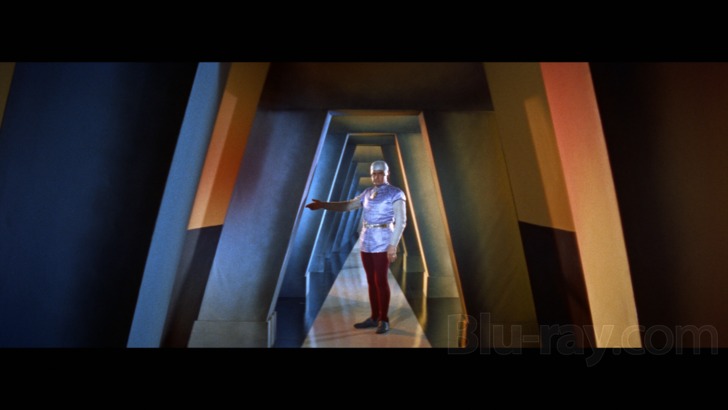
World Without End was an early Cinemascope production, which was a splurge by Allied Artists, and the image retains the characteristic softness imparted by first-generation anamorphic lenses. The cinematographer was Ellsworth Fredericks (Invasion of the Body Snatchers). For this 1080p, AVC-encoded Blu-ray, the Warner Archive Collection commissioned a new scan of an interpositive, which was performed (at 2K) by Warner's Motion Picture Imaging facility, followed by the usual color-correction and cleanup. The resulting image captures the often laughable set design, costumes and makeup in impressive detail that isn't always favorable to this low-rent production, but at least the image is clean and the film's grain is natural and, within the limitations of the source, finely resolved. Colors and densities tend to fluctuate at scene changes, but this is an unavoidable side effect of the process used to create optical dissolves, especially on a low budget. WWE doesn't have an especially rich or intense palette, except for the reds that first appear over the opening image of an atomic blast, then return for the Mars expedition and again in the underground civilization of the future, where they are associated with passion and vitality. With no extras, not even a trailer, WAC has been able to master the 80-minute film on a BD-25, while still retaining a high average bitrate of 33.98 Mbps.
World Without End Blu-ray Movie, Audio Quality 
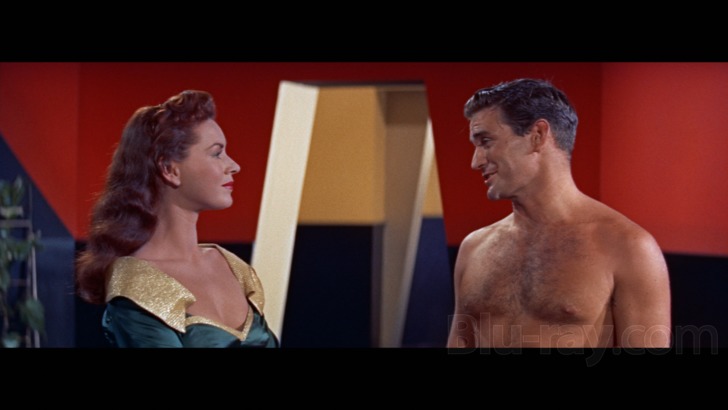
WWE's original mono audio has been taken from an optical track positive and encoded on Blu-ray in lossless DTS-HD MA 2.0. The soundtrack is serviceable but unremarkable, with generic effects for familiar elements like gunshots and explosions. The most memorable sound is that of automated doors opening and closing, which anticipates the Starship Enterprise. The dialogue is clearly rendered, and the melodramatic score by Leith Stevens (The War of the Worlds) does what it can to supply suspense and a sense of danger. WWE's audio may not amount to much, but the Blu-ray accurately reproduces the source.
World Without End Blu-ray Movie, Special Features and Extras 
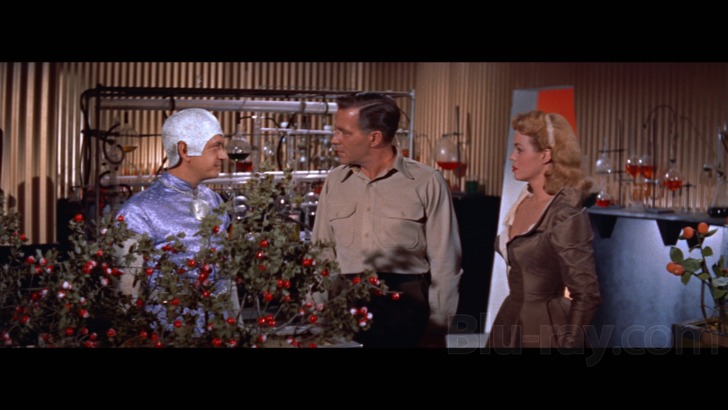
No extras are included. Warner's 2008 DVD (in a double feature with Satellite in the Sky) was similarly bare.
World Without End Blu-ray Movie, Overall Score and Recommendation 
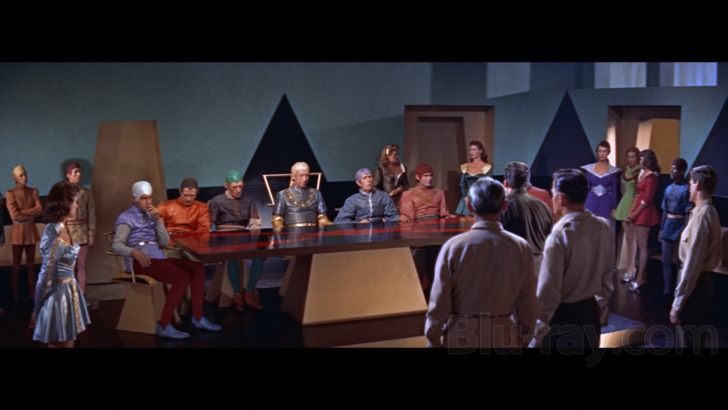
Four years after WWE, Rod Taylor would star in another tale about temporal travel, The Time
Machine, based on H.G. Wells's novel. Ironically, the Wells Estate is reported to have sued
Allied Artists over WWE, claiming that writer/director Edward Bernds misappropriated Wells's
story. The outcome of the suit has not been reported, but it's unlikely that the Estate prevailed.
Aside from the element of time travel, the two plots have little in common, and each is
recognizably a product of its era, with Wells reflecting Victorian concerns about the state of the
British Empire and WWE mirroring the angst of the early nuclear age. (George Pal's
adaptation of Wells's novel for the screen introduced similar elements.) WAC has done their
usual creditable job with WWE, and if you're fond of the film, the presentation is recommended.
Similar titles
Similar titles you might also like

This Island Earth
1955

Invaders from Mars 4K
Standard Edition
1953

The Angry Red Planet
1959

Queen of Outer Space
Queen of the Universe / Warner Archive Collection
1958

It! The Terror from Beyond Space
2K Restoration
1958

Battle Beyond the Stars
2K Restoration
1980

The Day Time Ended
40th Anniversary Special Edition
1979

Star Pilot
2+5: Missione Hydra
1966

The Man from Planet X
1951

When Worlds Collide
1951

The Phantom Planet
1961

Attack of the Puppet People
1958

Conquest of Space
1955

It Came from Outer Space 4K + 3D
Universal Essentials Collection
1953

The Thing from Another World
Warner Archive Collection
1951

The Blob
1958

Buck Rogers in the 25th Century
Buck Rogers in the 25th Century: Awakening
1979

Fiend Without a Face
1958

Queen of Blood
1966

The Quatermass Xperiment
Special Edition | The Creeping Unknown
1955